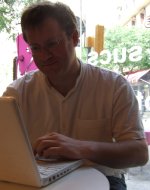Richard Reeve
Richard Reeve

Co-director, Boyd Orr Centre for Population and Ecosystem Health
Professor of Population and Ecosystem Health
Institute of Biodiversity, Animal Health and Comparative Medicine
College of Medical, Veterinary & Life Sciences
Room 314, Graham Kerr Building
University of Glasgow, Glasgow, G12 8QQ
Tel.: +44 141 330 6638
Email: richard.reeve@glasgow.ac.uk
Previous Academic History
Previous Academic History
2003-2005: Research Fellow, Institute of Perception, Action and Behaviour, University of Edinburgh
2003: Visiting Researcher, Institute of Neuroinformatics, ETH (Zurich) / University of Zurich
2000-2002: Researcher, Department of Psychology, University of Stirling
1999: Researcher, Centre for Cognitive Science, University of Edinburgh
1994-1999: PhD, Department of Artificial Intelligence, University of Edinburgh
1993-1994: MSc, Department of Artificial Intelligence, University of Edinburgh
1989-1992: BA, Mathematics, University of Cambridge
Research Interests
Research Interests
I am a modeller in population and ecosystem health with a background in artificial intelligence and machine learning. I moved into the life sciences in 2007 to study diversity. My work focusses on developing the connections between different fields that use diversity measures, from the level of the transcript to the ecosystem, and the underlying mathematics.
On the application side, I have a particular focus on the measurement of biodiversity of ecosystems, particularly plants, where we work to assemble the spatially and temporally incomplete global data on plant abundance into an understanding of the impact of climate and land use change on species distributions. I currently work on the impact of Landscape Decision making on biodiversity within the UK, working for several years with Peatland ACTION within NatureScot, Scotland's Nature Agency, and more recently beginning similar work with Natural Resources Wales on Welsh peatland restoration.
On the mathematical side, my interests are in the spatial and temporal partitioning of diversity, and how we can identify areas in an ecosystem or viral phenotypes that are novel, that contribute particularly to overall diversity of the system, or that are changing faster than their surroundings.
I also work on how to use measurements of similarity amongst individuals in diversity measures to improve our understanding of the true diversity of different systems - this has led to work with FAO and WHO on the antigenic similarity of viruses, especially foot-and-mouth disease and flu, where I work on the relationship between their genotypic and phenotypic evolution. This has applications in vaccine selection, which is a diversity-related problem, in this case one of maximising the diversity of viruses covered by a specific vaccine.
I also work with colleagues interested in the emergence of antimicrobial resistance phenotypes and genotypes, and how we can identify sources of novel phenotypes from their background diversity or similarity to existing strains, and also on the diversity of the major histocompatibility complex in sheep and cattle, and its relationship to disease resistance.
Much of my work involves the application of mathematical, computational and statistical tools to underexploited biological datasets, particularly focussing on pathogens and vaccines, where large amounts of data are collected on protection for testing purposes which can be reused to investigate vaccine:immune system interaction. I am more generally interested in epidemiological systems and host-pathogen interactions, particularly how they affect our ability to predict the effects of vaccines in the real world.
I have also recently jointly led a COVID-19 consortium, with my focus being particularly on the development of a data pipeline to trace the pathway from FAIR (Findable, Accessible, Interoperable, Resuable) data all the way through to policy advice.

